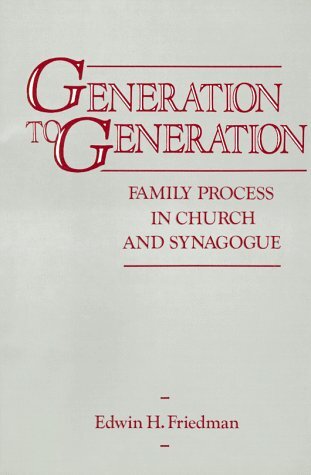Ed Friedman, Generation to Generation: Family Processes in Church and Synagogue. Guilford Press, 2011.
LifeandLeadership.com Summary
This is the paperback edition of the original which was published in 1985. This book has a reputation of revolutionizing the way its readers view congregational life. Based on his experience as a rabbi and marriage and family therapist, the late Ed Friedman gives the most comprehensive and practical understanding of congregations as emotional systems, building upon the theories of Murray Bowen, of whom Friedman was a long-time student.
Take conflict, for example. While emotional systems deal with much more than conflict, and should not be viewed strictly through that lens, the application to conflict illustrates the helpfulness of the theory. In emotional systems, conflicts are explained not from a linear standpoint, i.e. A causes B, but from a systemic perspective where all participants are contributors. Each part of the system is connected to, or has its own effect upon, every other part. This helps to explain why many issues that arise within a congregation cannot be settled on the level of content, but must be viewed as representations of how the persons surrounding the issues are participating in the relational system. Issues may seem settled, but if the relational system continues to function the same way, the same or other issues will reappear later, because they were merely symptomatic of the emotional dynamics among the people involved.
Another plus is Chapter 10, “Leaving and Entering a Congregational Family,” which is an excellent application of family systems theory to leave-taking, especially in challenging the “lame duck myth.”
This book begins by explaining the major concepts of family systems theory, and applies them to organizational life, leadership, and the leaders family. It is full of examples, which makes these complex ideas easier to grasp. Few books are as insightful and helpful in helping church leaders understand congregations. It is the standard in applying emotional systems theory to congregations.
From the Publisher
This groundbreaking volume applies the concepts of systemic family therapy to the emotional life of congregations and their leaders. Challenging many of the conventions of pastoral counseling, Edwin H. Friedman shows how family theory points to a less stressful approach to the full range of the clergy’s responsibilities. He also illuminates how congregational dynamics can be a useful model for the study of any family enmeshed in larger systems, and how such systems can themselves be viewed as “families.”
Friedman compares the emotional processes at work within individual families to those in church and synagogue, suggesting that clergy can often do more to help families by the way they lead their congregations than they can through specific counseling interventions. Specific topics examined in depth include leadership through self-differentiation, managing separations in families and in congregations, and the influence of previous generations upon life cycle events. The power of the family model is clearly demonstrated in numerous examples drawn from Friedman’s own extensive experience as a rabbi and practicing family therapist and from many other rabbis, priests, nuns, and ministers with whom he worked.
Both clergy and lay leaders will find that this book directly addresses the dilemmas and crises they encounter daily, while family therapists and other helping professionals may wish to recommend it to students and clients as a lucid introduction to family processes.
About the Author
Edwin H. Friedman (1932-/1996), a family therapist and ordained rabbi, was born in New York City and worked for more than 35 years in the Washington, DC metropolitan area. Well known in the fields of mental health and pastoral education, Dr. Friedman brought his unique blend of systems thinking, motivational style, and common sense to his highly regarded work as a consultant and leadership trainer to diverse professional and government organizations. His acclaimed publications include Generation to Generation, Friedman’s Fables, and the video program Reinventing Leadership.
***For additional information on this resource, including reviews, click the bookstore links. Check the reference at page top or the links below for resource guides on related topics.***
See Other Resources on Leadership:
See Resources on Over 100 Areas of Ministry Leadership:


